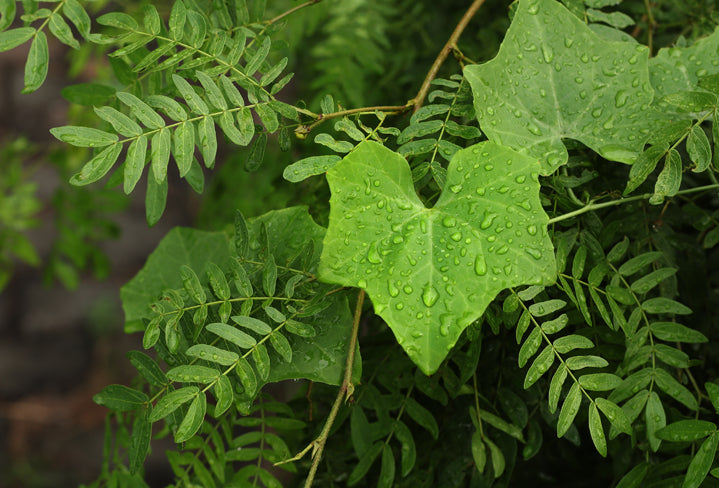
Already reminiscing about the first rain of the monsoon?
The Monsoon brings with it long-awaited downpours and a pleasant breeze that soothes and rejuvenates the mind, body, and soul. At the heart of these showers, blooms the elixir of life and a sense of freshness. Drawing from this renewed vitality in nature, Ayurveda suggests that ‘Varsha Ritu’ is the best time to undergo rejuvenation therapies, reparative natural treatments, and detoxification therapies.
However, with Varsham Ritu or Monsoon, comes an imbalance of the Vata Dosha. Vata accumulates during the dry & dehydrating heat of summers and is further aggravated during monsoon due to hot, humid, and wet conditions. Vata dosha is responsible for bodily senses, creative thinking, reasoning, and movement of thought. It also serves an essential purpose in the movement of food through the digestive tract, eliminating waste, circulation of blood, heart rhythm, perspiration, menstruation, and much more. Therefore, when Vata is out of balance, it manifests in numerous ways such as sluggish digestion, accumulation of toxins, constipation, dryness in the body, dry coughs, fatigue, gas, intestinal cramps, weak tissues, etc.
Hence, it is important to keep our doshas in check and with the rainy season officially here, we're taking stock of what this change in season means for our overall well being and doshic balance. So, read along to unravel tips that will keep you supercharged for your puddle jumping days.
Practice ‘Abhyanga’
‘Abhyanga’ is described as the oiling and massaging of the skin in a specific motion. It is one of the most sought-after rituals for balancing the aggravated Vata Dosha in the body. Regular Abhyanga is highly advocated to help increase blood circulation, facilitate removal of toxins from the tissues thereby recuperating them, relieve physical and mental fatigue, relax the muscles, and relieve body pain. Sesame oil is highly recommended to balance the vitiated Vata dosha.
Vata-Balancing Herbs
Ayurveda has a long history detailing the use of herbs and spices to help bring warmth, stability, and nourishment to Vata Dosha. Warm spices like asafoetida, ginger, garlic, and black pepper help ground the body and balance the dosha. Herbs like Ashwagandha, Brahmi, Lemongrass, etc. help soothe the mind and nervous system. It also promotes a sense of calm, ease, and awareness. Herbs and spices such as Hing, Cumin Seeds (Jeera), Ajwain, Fennel, Cardamom, Haritaki, etc. help relieve digestive troubles and help eliminate excess Vata in the digestive tract. Herbal teas and infusions such as our herb-infused Shubh Saanjh Chai do wonders to balance the vitiated Vata dosha and help boost digestion.
Practice Meditation
Vata imbalance can result in disrupting your mental and physical health, throwing you off sync with yourself and nature. To reinstate this balance, it is important to center oneself and get a fresh perspective on life. Meditation is one of the best ways to do that by calming a racing mind, improving focus, and making way for creativity to flourish. Meditation helps you to find your inner peace and create balance in life.
Healing Movements
Exercising or movement comes naturally to Vata people. However, it is highly recommended to avoid overexertion as it can further aggravate the airy dosha. Therefore, choosing an activity that helps direct one's excess energy creatively and productively helps balance the vitiated dosha. Breathing exercises such as Pranayama and Nadi Shodhan, and somatic practices such as Tai chi, Qi gong, and Yoga are highly recommended for Vata types. These exercises help calm the mind and harmonize the mind, body, and spirit.
Support Digestive Health
The rainy season is when we are most prone to diseases as the digestive fire weakens and disrupts the balance of doshas. Therefore, it is essential to balance doshas and adopt measures to enhance digestive activity. This includes consuming freshly prepared meals, and easily digestible food that is, cooked well and mushy in texture to prevent further irritation of the digestive system. Eating cooked or boiled vegetables and soups in the rainy season also helps balance the Vata dosha, and provides nourishment. Include digestive herbs and spices like dried ginger, Hing, garlic in your cooking and diet to ward off stomach infections.
Apart from these diet and lifestyle measures, one can also opt for purification and detoxification therapies that help restore the balance of the doshas in the body. While a balanced Vata paves way for creativity, freedom, and movement, an imbalanced Vata can lead to stress, anxiety, body pain, digestive troubles, etc, and also vitiate the other two doshas. So, this Monsoon, let wellness rain as you harness the harmonizing power of Ayurveda!
In case you are suffering from chronic Vata imbalances such as gas-related issues, joint pain, weak bones, arthritis, stress, and anxiety we encourage you to reach out to Ayurveda doctors for consultation.

Comments (0)
Back to News